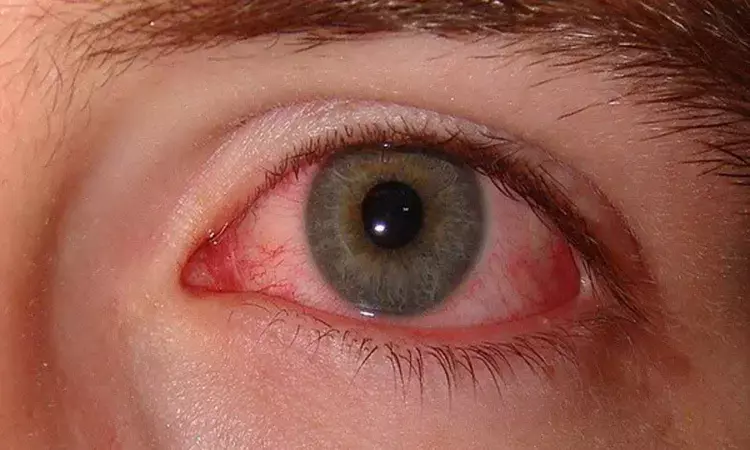- Home
- Medical news & Guidelines
- Anesthesiology
- Cardiology and CTVS
- Critical Care
- Dentistry
- Dermatology
- Diabetes and Endocrinology
- ENT
- Gastroenterology
- Medicine
- Nephrology
- Neurology
- Obstretics-Gynaecology
- Oncology
- Ophthalmology
- Orthopaedics
- Pediatrics-Neonatology
- Psychiatry
- Pulmonology
- Radiology
- Surgery
- Urology
- Laboratory Medicine
- Diet
- Nursing
- Paramedical
- Physiotherapy
- Health news
- Fact Check
- Bone Health Fact Check
- Brain Health Fact Check
- Cancer Related Fact Check
- Child Care Fact Check
- Dental and oral health fact check
- Diabetes and metabolic health fact check
- Diet and Nutrition Fact Check
- Eye and ENT Care Fact Check
- Fitness fact check
- Gut health fact check
- Heart health fact check
- Kidney health fact check
- Medical education fact check
- Men's health fact check
- Respiratory fact check
- Skin and hair care fact check
- Vaccine and Immunization fact check
- Women's health fact check
- AYUSH
- State News
- Andaman and Nicobar Islands
- Andhra Pradesh
- Arunachal Pradesh
- Assam
- Bihar
- Chandigarh
- Chattisgarh
- Dadra and Nagar Haveli
- Daman and Diu
- Delhi
- Goa
- Gujarat
- Haryana
- Himachal Pradesh
- Jammu & Kashmir
- Jharkhand
- Karnataka
- Kerala
- Ladakh
- Lakshadweep
- Madhya Pradesh
- Maharashtra
- Manipur
- Meghalaya
- Mizoram
- Nagaland
- Odisha
- Puducherry
- Punjab
- Rajasthan
- Sikkim
- Tamil Nadu
- Telangana
- Tripura
- Uttar Pradesh
- Uttrakhand
- West Bengal
- Medical Education
- Industry
PCOS patients at higher risk of developing dry eye

Turkey: Dry eye can be established through the use of sensitive tests in polycystic ovary syndrome (PCOS) patients, according to a recent study published in the journal Eye & Contact Lens.
Yonca Asfuroğlu, Yozgat Bozok University, Yozgat, Turkey, and colleagues evaluated changes in tear function of PCOS patients. They also determined whether there is a correlation between dry eye parameters, novel hematologic markers, and hormonal levels.
The study included 47 PCOS patients and 43 age-matched patients with unexplained infertility. The researchers evaluated follicle-stimulating hormone, luteinizing hormone, estradiol, thyroid-stimulating hormone, prolactin, dehydroepiandrosterone sulfate (DHEA-S), 17-OH progesterone, fasting and postprandial glucose, fasting insulin, and cholesterol metabolites. The neutrophil-to-lymphocyte ratio (NLR) and platelet-to-lymphocyte ratio were obtained from a complete blood count. The Ocular Surface Disease Index (OSDI) questionnaire was administered, and all patients underwent tear break-up time (BUT) and Schirmer I tests.
The mean age of the PCOS group and the control group was 27.66±3.96 years and 29.28±6.83 years, respectively.
Read Also: Researchers develop Novel lenses that self moisturise to prevent dry eye disease
Key findings of the study include:
- Schirmer I test scores and BUT values were significantly lower and OSDI results were significantly higher in the PCOS group.
- An inverse correlation was found between DHEA-S and BUT values in the PCOS group.
- A negative correlation was also present between NLR and BUT values in the PCOS group.
"Dry eye can be well established by sensitive tests in patients with PCOS. The severity of dry eye may be correlated with the level of inflammation and hyperandrogenism," concluded the authors.
"Underlying inflammation, in addition to hyperandrogenism and insulin resistance, can contribute to dry eye disease in these patients," they wrote.
Read Also: Mindful yoga reduces testosterone levels and improves symptoms in PCOS
The study, "Association Between Dry Eye and Polycystic Ovary Syndrome," is published in the journal Eye & Contact Lens.
Dr Kamal Kant Kohli-MBBS, DTCD- a chest specialist with more than 30 years of practice and a flair for writing clinical articles, Dr Kamal Kant Kohli joined Medical Dialogues as a Chief Editor of Medical News. Besides writing articles, as an editor, he proofreads and verifies all the medical content published on Medical Dialogues including those coming from journals, studies,medical conferences,guidelines etc. Email: drkohli@medicaldialogues.in. Contact no. 011-43720751


